GW Law Welcomes New Associate Dean for Academic Affairs
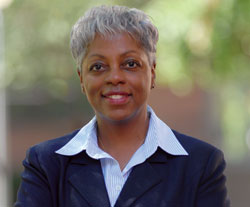 Jessica McConnell
Jessica McConnell
Following a distinguished, 23-year career as an attorney in the U.S. Navy Judge Advocate General Corps, Charlotte Wise joined GW Law last spring as associate dean for academic affairs. A highly decorated Navy captain, Wise comes to GW straight from a tour as commanding officer of the Naval Justice School in Newport, R.I.
“It’s been a seamless transition,” she states, noting that the “nuts and bolts” of both jobs are similar. “The Naval Justice School trains Navy, Marine Corps, and Coast Guard judge advocates and enlisted paralegals in the military justice system, while GW Law educates and prepares law students for the civilian legal profession. I’m thoroughly enjoying being a part of another organization that cares so much about preparing young people for the legal field.”
Prior to her tour at the Naval Justice School, Wise served as commanding officer of the Naval Legal Service Office, Europe and Southwest Asia, from 2003 to 2006, headquartered in Naples, Italy. Wise’s appointment to GW Law marks her return to the Washington area, where she completed tours of duty as legislative counsel to the Office of the Secretary of the Navy and as executive assistant and special counsel to the General Counsel of the Department of the Navy. A woman of many firsts, she was the first African- American woman to reach the rank of captain in the Navy JAG Corps and the first female attorney to serve aboard the USS Holland (AS 32). She earned a JD from Brooklyn Law School and an LLM from the Army Judge Advocate General’s School.
At GW, Wise helps to oversee the Law School’s academic enterprise. Her wide-ranging portfolio of responsibilities includes serving as the point of contact for the Law School’s 250 adjunct law faculty members and working closely with the deans and program directors on “everything that touches upon academics”—from course scheduling to exam administration.
Education was a natural field for her to enter following her retirement from active service, she says. “It’s become our family business,” she notes, pointing out that her daughter Stephanie is a high school science teacher in South Carolina and her husband, Mark, currently a public defender for Fairfax County, has taught a great deal over the years while accompanying her to postings up and down the East Coast and overseas.
Wise says she cannot think of a “better place to have landed” than GW Law. “It’s a great environment to work in, and everyone here has been wonderful,” she states. “It’s truly been a great experience so far.”
—Jamie L. Freedman
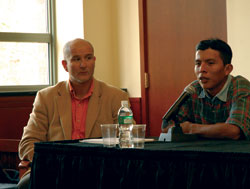
GW Law Professor Arturo Carrillo and a Naso tribe representative
Claire Duggan
International Human Rights Clinic Hosts Panama Natives
Indigenous peoples from the Naso and Ngobe communities in Panama came to Washington in October to speak to groups about the issues facing indigenous people in their country. Stories they told involved land taken by force to be developed by companies and threats against those who have spoken out about these human and environmental rights abuses.
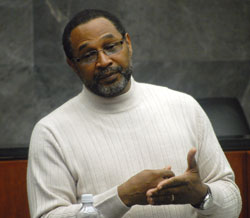
Claire Duggan
Enrichment Lecture: “Redemption”
Former death-row inmate William “Billy” Neal Moore is a man overwhelmed with gratitude. After spending nearly 17 years on Georgia’s death row, the prisoner-turned-Pentecostal-preacher says he is living proof that a wasted life can be revived for the good of humanity. Moore spoke in November at an Enrichment Lecture about how, as a younger man on drugs, he committed a robbery and murder. He spoke about his time on death row and other factors about his case, including the requests from the victim’s family that not only spared him from a death sentence but also led to his eventual release. Moore now tours the country speaking to law students, at-risk youth, and anyone who will listen about his story of remorse, forgiveness, and redemption.
Law Library Publication Wins AALL Award
The American Association of Law Libraries (AALL) has named A Legal Miscellanea: A Newsletter for the Friends of the Jacob Burns Law Library the winner of its 2008 Excellence in Marketing Award in the category of Best Newsletter. The award, which is sponsored jointly by AALL and legal publisher Thomson West, was presented at AALL’s annual meeting in July in Portland, Ore.
“We are honored,” says Jennie C. Meade, GW director of special collections and editor of the publication.
Launched in 2004, A Legal Miscellanea is a semiannual newsletter that seeks to forge and strengthen the link to the Jacob Burns Law Library’s community of friends by providing information about its collections, development activities, and friends events and by notifying the legal and scholarly communities of the resources available.
Rader Delivers Inaugural Speech in Katz IP Law Speaker Series
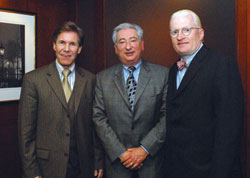
Hon. Randall R. Rader, JD ’78 (left), with A. Sidney Katz, JD ’66, and Associate Dean John Whealan during the Katz IP Law Speaker Series
Claire Duggan
Hon. Randall R. Rader, JD ’78, a judge on the U.S. Court of Appeals for the Federal Circuit, delivered the inaugural speech in the A. Sidney Katz Intellectual Property Law Speaker Series on Oct. 22. The well-attended event brought together more than 100 GW Law alumni, students, and faculty members for Rader’s insightful talk on “Trying Patent Cases: Reflections From a Federal Circuit Judge.” A reception followed.
The endowed IP lecture series, which brings prominent practitioners to the Law School to speak about intellectual property law issues, is the latest contribution to GW Law by Katz, JD ’66. In addition to serving on the GW Law Intellectual Property Advisory Board for the past eight years, Katz has enhanced the Law School through numerous philanthropic gifts. His name adorns the Law School’s admissions and financial aid reception area, as well as the archway that connects 20th Street to the University Yard.
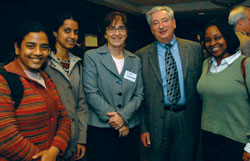
A. Sidney Katz, JD ’66, and Associate Dean Susan Karamanian spend time with GW Law students during the inaugural event of the Katz IP Law Speaker Series.
Claire Duggan
Katz is managing partner of Husch Blackwell Sanders Welsh & Katz in Chicago, formed in June when his 45-attorney IP firm, Welsh & Katz, combined with the general practice firm Husch Blackwell Sanders. He has received widespread recognition for his work on the protection of computer programs and video games under copyright laws.
“Sid Katz’s continued and generous support of the Law School allows us to produce outstanding events like this one, which we are pleased to open to all members of the GW family,” says John Whealan, associate dean for intellectual property law studies. This spring, the series will bring Bruce Sewell, JD ’86, senior vice president and general counsel of Intel Corp., to GW as the next Katz Speaker. For reservations and information, please RSVP to
iplaw@law.gwu.edu or call 202-994-1806.
—JLF
Jeanne Fromer Lectures in Fall IP Workshop Series
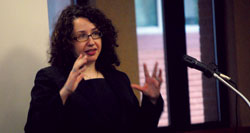
Professor Jeanne Fromer from the Fordham University School of Law wrapped up the Fall 2008 IP Workshop Series with a talk on “Claiming Intellectual Property.”
Claire Duggan
Fordham University School of Law Associate Professor Jeanne C. Fromer presented the concluding lecture in GW Law’s Fall 2008 Intellectual Property Workshop Series on Nov. 6. The presentation, titled “Claiming Intellectual Property,” explored the claiming systems of patent and copyright law.
Sponsored by a gift from the Bureau of National Affairs Inc., the lunchtime speaker series brought four IP professors from around the country to GW this fall to discuss wide-ranging topics in the IP field. The series kicked off with a lecture by John M. Golden, assistant professor at the University of Texas at Austin Law School, on “The Supreme Court as ‘Prime Percolator’: A Prescription for Appellate Review of Questions in Patent Law.” Next on the agenda was a talk by Professor Gregory N. Mandel from Temple University Beasley School of Law on “Left Brain Versus Right Brain: Competing Conceptions of Creativity in Intellectual Property Law.” Rounding out the series was a presentation by Beth S. Noveck, a professor at New York Law School and director of the Institute for Information Law and Policy, on “Public Participation in Intellectual Property Policymaking.”
Upcoming speakers for the spring include Kevin Collins, associate professor at Indiana University School of Law-Bloomington, who will address “Patent Eligibility and Meaning” (Jan. 29); Philippe Gillerion, professor at the Lausanne Law School and Fribourg Law School, who will talk about online advertising business models and trademarks (Feb. 10); Greg Vetter, assistant professor at the University of Houston Law Center, who will discuss commercial free and open-source software (Feb. 19); and Michael Carroll, professor at Villanova University School of Law, who will deliver a talk titled “From Empire to Federation: Reconceiving Copyright Law” (March 19). To attend one or more of these free events, which include lunch, please RSVP at least one week in advance to iplaw@law.gwu.edu. For further information, including venues, please check the upcoming events page on the IP Web site at http://www.law.gwu.edu/Academics/FocusAreas/IP/Pages/Default.aspx.
—JLF
CIEC Makes an Impact With Education Programs
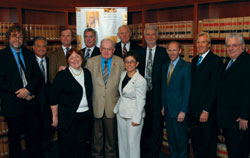
In June, CIEC held an event with Broadcast Music Inc. Back row: Dennis Morgan, Grammy Award-winning songwriter; Del Bryant, president and CEO, BMI Inc.; Robert P. Merges, Berkeley Law professor; Richard Conlon, vice president, BMI Inc.; Ralph Oman, GW Law professor and U.S. Register of Copyrights, 1985-1993; Michael Remington, Drinker, Biddle & Reath; Michael P. Ryan, director, GW Law-CIEC; Robert Brauneis, co-director, GW Law IP Program; Fred Cannon, SVP, BMI Inc. Front row: Marybeth Peters, JD ’71, U.S. Register of Copyrights; Congressman Howard Coble (R-N.C.); Gigi Sohn, Public Knowledge.
Steve O’Toole
The Creative and Innovative Economy Center started its third year with a series of educational programs in the United States and around the globe. CIEC extends the legacy of GW’s IP law program while encouraging scholars to broaden their horizons by focusing on a range of economic and legal issues that are best studied together. The center demonstrates how IP laws, judicial capacity, and enforcement are critical tools for alleviating poverty and improving health care.
In June, CIEC hosted an event with Broadcast Music Inc. to discuss potential changes in the legal structure of intellectual property rights that apply to music. University of California, Berkeley, Law Professor Robert P. Merges presented a paper, “The Continuing Vitality of Music Performance Rights Organizations,” in which he warns that proposals to change the existing music IP rights system could stunt creativity in the United States and around the world. Merges believes that the more radical proposals would eviscerate or eliminate performing rights organizations, which could weaken all of the gains songwriters have made over the past century.
Last spring, CIEC hosted three events in the United States to recognize World Intellectual Property Day. The events included a roundtable program for the United Nations community in New York; a reception for the Washington, D.C., IP community on Capitol Hill; and an educational program in Los Angeles geared toward the entertainment industry. Juan Esteban Orduz, president of the Colombian Coffee Federation, spoke at the D.C. event, and legendary Indian filmmaker Bobby Bedi keynoted at both the D.C. event and the L.A. event.
Far from our Foggy Bottom campus, CIEC hosted events on innovation in technology, agriculture, and health care in New Delhi; São Paulo, Brazil; Bangalore, India; Amman, Jordan; and Bangkok, Thailand.
GW Law alumni are welcome to attend future events. Visit CIEC at www.law.gwu.edu/ciec for more information.
Dean Robinson Receives NBA’s Highest Honor
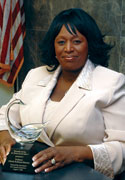
Associate Dean for Trial Advocacy Alfreda Robinson won the NBA’s highest honor in September. Here, Robinson is pictured with the NBA’s Sankofa Award, which she won in 2006.
Claire Duggan
The National Bar Association in September awarded its highest honor, the C. Francis Stradford Award, to GW Law Associate Dean for Trial Advocacy Alfreda Robinson.
The award honors the legacy of pioneering civil rights attorney Cornelius Francis Stradford, a co-founder of the NBA. Previous award recipients include civil rights giants Fred Gray, who represented the late Dr. Martin Luther King and Rosa Parks, and Judge Joyce London Alexander, the country’s first African-American chief United States magistrate judge.
“I am deeply honored and appreciative to be in such company,” Robinson says.
At last year’s NBA annual meeting, Robinson was presented with the Presidential Award, which noted her dedication and outstanding service to the NBA. The award coincided with her appointment as chief counsel to the president of the National Bar Association. Robinson’s duties as chief policy director and operations manager began the same day she was given the Presidential Award.
“Dean Robinson has yet again set an outstanding example of community service and commitment, and we are very proud of her and her accomplishments,” Dean Frederick M. Lawrence says.
In 2006, the NBA honored Robinson with its prestigious Sankofa Award at its annual meeting in Detroit. The Sankofa Award acknowledged Robinson for “empowering our futures by her tireless efforts to make a quality education accessible to all.”
The National Bar Association is the oldest and largest organization of attorneys and judges of color in the world. Founded in 1925, the NBA represents over 20,000 lawyers, judges, legal scholars, and law students internationally.
Robinson also was honored this past May by GW alumni and students with the Patricia Roberts Harris Award. Robinson received the accolades at the 30th annual gala event hosted by the Black Law Student Association and the Black Law Alumni Association.
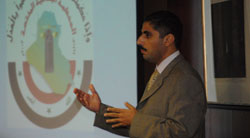
Hon. Ra'id Juhi Hamadi Al Saedi
Claire Duggan
Shulman Foundation Lecture
The Hon. Ra’id Juhi Hamadi Al Saedi, investigating judge during the trial of Saddam Hussein, gave the Shulman Foundation Lecture titled “The Challenges of the Investigation and Trial of Saddam Hussein.” Juhi gave a detailed account of the extensive evidence gathering that was done to prepare the case against Hussein, and he explained the challenges this and other aspects of the case posed. He also discussed aspects of the Iraqi legal system.
Deconstructing Contractor Compliance Rules
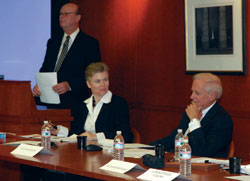
Panelists, from left: Richard Bednar, Crowell & Moring LLP; Pascale Helene Dubois, sanctions evaluation and suspension officer, Office of Evaluation and Suspension, the World Bank; Steven A. Shaw, deputy general counsel (contractor responsibility), U.S. Air Force.
Claire Duggan
The George Washington University Law School Government Procurement Law Program presented a special colloquium in December to address how contractors and attorneys are struggling to meet a new U.S. government contractor compliance rule, including a requirement calling for mandatory disclosures of fraud and criminal behavior. The stakes are even higher now, in a globalized procurement market, because other institutions around the world—including the World Bank—are looking to contractors’ ethical performance in the U.S. market. The program featured a panel of distinguished practitioners and officials discussing the new rules and their potential impact on contractors, both here and abroad.
Raising the Bar
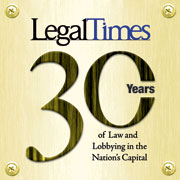
Courtesy of Legal Times
Several of GW Law’s finest alumni were recognized by the Legal Times for their impact on the Washington legal community over the past three decades. In a 30th-anniversary issue published in May, Michael Hausfeld, JD ’69; Susan Hoffman, JD ’79; Jack Olender, LLM ’61; and GW Law Professor Joan Strand, BA ’72, JD ’75, were four of the 30 “Visionaries” named by the publication because their “foresight and hard work have changed the business of law in Washington,” Editor David Brown wrote.
Hausfeld, a partner at Cohen Mistein Hausfeld & Toll, has won billions of dollars in verdicts and settlements in groundbreaking class action suits. Some of his major cases have included representing Nazi slave labor victims as well as Native Alaskans affected by the Exxon Valdez oil spill.
Hoffman was recognized by the publication for being a pro bono trailblazer. As the first public service counsel in the District, she has the responsibility to promote and oversee pro bono cases. Hoffman, who has had the position since 1988, today also serves as president of the Crowell & Moring Foundation, a nonprofit organization that works with Equal Justice Works.
Olender first made his mark in 1976, when he won the first multimillion-dollar obstetric malpractice suite. Since then, he and his legal team at Jack H. Olender & Associates have prosecuted more than 200 cases ending in verdicts or settlements of at least $1 million.
Strand, who has been a professor at GW Law since 1979, was honored by the publication for being a legal advocate for the poor. She supervises GW Law’s Civil Litigation Clinic, which enables students to represent low-income clients free of charge in family law cases and other civil matters in D.C. Superior Court.
Legal Times also recognized the late Harold H. Greene, AA ’49, JD ’52, as one of 30 “Pioneers” who made an indelible impact on the practice of law in Washington. Greene, a federal judge for the United States District Court for the District of Columbia, presided over United States v. AT&T, the antitrust suit that broke up the AT&T vertical market monopoly on the telecommunications industry. GW Law created the Harold H. Greene Professor of Law endowed chair in his memory.
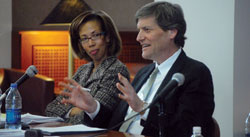
Professor Karen Brown and Symposium Adviser Professor Neil H. Buchanan during the “Government Finances Today and Economic Prosperity Tomorrow” panel.
Claire Duggan
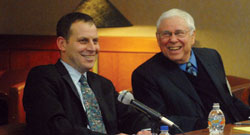
Cornell Law Professor Michael Dorf, well known for his Dorf on Law blog, presented a paper for the last panel, “The Living Constitution and Future Generations.” University of Texas at Austin Law Professor Sanford Levinson was one of the panel commentators.
Claire Duggan
GW Law Review Symposium:
“What Does Our Legal System
Owe Future Generations?”
Despite the diverse challenges facing the legal community as the first decade of the 21st century comes to a close, virtually all legal issues raise several interrelated questions. As we decide how or whether to change the law, in what way should our decisions be affected by our perceived obligations to our children, grandchildren,
and generations beyond? To what extent should we assume that we know what is best for future generations, and how much do we tie their hands by our decisions today? And how much should we sacrifice today to make the world “better” for future generations? These questions were explored in several specific legal contexts at The George Washington Law Review’s fall 2008 symposium: “What Does Our Legal System Owe Future Generations? New Analyses of Intergenerational Justice for a New Century.”
The symposium featured panels exploring intergenerational justice in the areas of legal philosophy, constitutional law, environmental law, fiscal policy, and reproductive rights. Within each panel, participants were challenged to determine what the nature and scope of concern for future generations should be in contemporary legal and policy decisions. This exploration of intergenerational justice was particularly timely because the symposium occurred just before the 2008 presidential election, when important legal and policy decisions were at the forefront of national discussion.
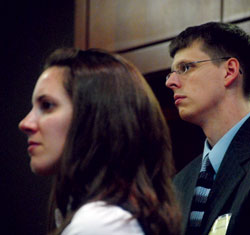
Law Review Editor-in-Chief Christopher Meeks and Projects Editor Jaclyn Lasaracina.
Claire Duggan
|
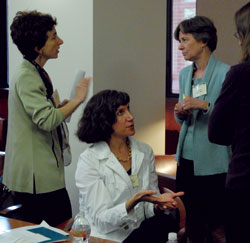
Professor Naomi Cahn and panelists Cornell Law Professor Sherry Colb and American University Law Professor Ann Shalleck speak after “The Impact of Reproductive Rights Today on the Composition of Future Generations” panel.
Claire Duggan
|
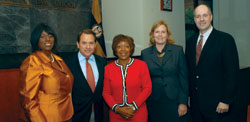
From left: Associate Dean Alfreda Robinson, Hon. Gerald Rosen, Hon. Petrese Tucker, Hon. Theresa Carroll Buchanan, and Professor Bradford Clark
Claire Duggan
Federal Judges Panel
In September, the GW Law LLM Litigation & Dispute Resolution Program hosted “Reaching Back, Lifting Up,” a coordinated effort by the Just the Beginning Foundation to have federal judges speak to law students about why they should pursue a career as a judge or work for a judge. Hon. Theresa Carroll Buchanan of the U.S. District Court for the Eastern District of Virginia; Hon. Gerald Rosen of the U.S. District Court for the Eastern District of Michigan; and Hon. Petrese Tucker of the U.S. District Court for the Eastern District of Pennsylvania spoke to GW Law students about their own careers in the judiciary and provided tips on getting clerkships.
GW Law in History
25 Years Ago
The Lerner Building, named for Theodore N. Lerner, JD ’50, was completed after five years of planning and construction. The $16.7 million project increased the school’s space by 42 percent and showcased eight new classrooms and a full moot court room. “With the completion of the new facilities, the Law School will have no barriers stopping it from becoming one of the best law schools in the country,” said then-Dean Jerome A. Barron, according to The Hatchet.
50 Years Ago
The George Washington Law Review was awarded first place in a national competition among law school journals sponsored by the Fletcher Foundation of Rosemead, Calif. The law review was deemed “the most outstanding presentation of articles, case notes, and reviews in the field of patents,” according to the 1958 Cherry Tree.
100 Years Ago
First-year law students were applauded by The Hatchet for “exercising a powerful influence in the student activities of the University.” In particular, the newspaper pointed out that the class participated in athletics more than any other class at GW. Of the 14 players awarded their “W” in football that season, four were first-year Law School members, the paper states.
GW Magazine gratefully acknowledges the assistance of University Archives in the identification of interesting historical information. For more about GW’s history, check out the University Archives Web site by accessing www.gwu.edu/gelman/archives. The site’s The GW and Foggy Bottom Historical Encyclopedia is especially informative.
 Jessica McConnell
Jessica McConnell














